小学英语教学设计Book 5 Module 3 At the weekend.
外研版五年级英语上册Module 3 周末或假期活动 附答案
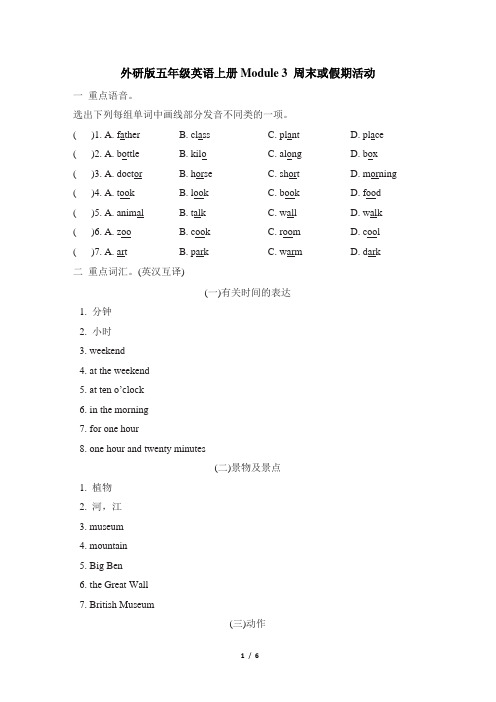
外研版五年级英语上册Module 3 周末或假期活动一重点语音。
选出下列每组单词中画线部分发音不同类的一项。
( )1. A. father B. class C. plant D. place ( )2. A. bottle B. kilo C. along D. box ( )3. A. doctor B. horse C. short D. morning ( )4. A. took B. look C. book D. food ( )5. A. animal B. talk C. wall D. walk ( )6. A. zoo B. cook C. room D. cool ( )7. A. art B. park C. warm D. dark二重点词汇。
(英汉互译)(一)有关时间的表达1. 分钟_____________________________2. 小时_____________________________3. weekend _____________________________4. at the weekend _____________________________5. at ten o’clock _____________________________6. in the morning _____________________________7. for one hour _____________________________8. one hour and twenty minutes _____________________________(二)景物及景点1. 植物_____________________________2. 河,江_____________________________3. museum _____________________________4. mountain _____________________________5. Big Ben _____________________________6. the Great Wall _____________________________7. British Museum _____________________________(三)动作1. 搭乘,乘坐(交通工具);需要花费(一定时间) _____________________________2. arrive _____________________________3. take a boat trip _____________________________4. have a good day _____________________________5. take photos/pictures _____________________________(四)其他1. 关于……的,表明……的_____________________________2. 达,计_____________________________3. 最_____________________________4. 拥有,具有_____________________________5. 如何,怎样_____________________________6. twenty _____________________________7. British _____________________________8. trip _____________________________9. along _____________________________10. lots of people _____________________________11. a photo of _____________________________12. very long and very old _____________________________三重点句子。
广州版英语五年级上册Module 3 《At the weekend》教学设计
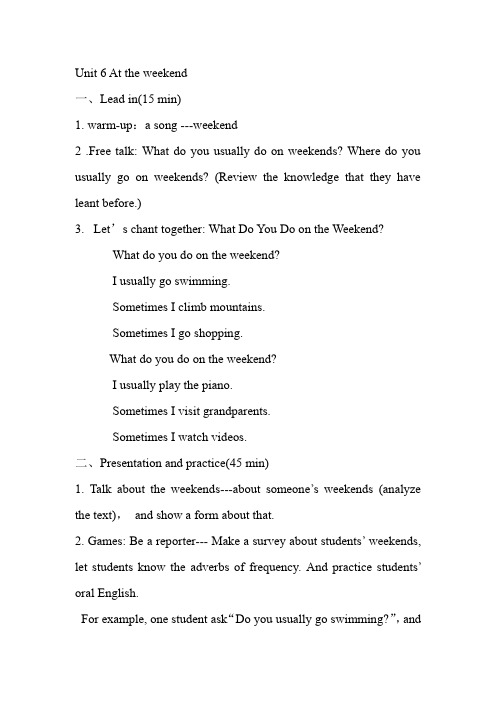
Unit 6 At the weekend一、Lead in(15 min)1. warm-up:a song ---weekend2 .Free talk: What do you usually do on weekends? Where do you usually go on weekends? (Review the knowledge that they have leant before.)3. Let’s chant together: What Do You Do on the Weekend?What do you do on the weekend?I usually go swimming.Sometimes I climb mountains.Sometimes I go shopping.What do you do on the weekend?I usually play the piano.Sometimes I visit grandparents.Sometimes I watch videos.二、Presentation and practice(45 min)1. Talk about the weekends---about someone’s weekends (analyze the text),and show a form about that.2. Games: Be a reporter--- Make a survey about students’ weekends, let students know the adverbs of frequency. And practice students’oral English.For example, one student ask“Do you usually go swimming?”,andthe other student answer, “Yes, I do. I often go swimming…”. Then the student write down “ xx often goes swimming.”….(That also can let them review the content about the unit3.)3. Games: You do, I guess. To guess phrases from this unit ---- Teacher plays the pictures on PPT, and one student look at the picture and do the actions, and the other students stand in front of the blackboard and can’t look at the picture, according to the actions to guess the phrases andwrite down the phrases.(phrases: wake up, go out, go to the library, stay at home, watch TV, make breakfast…)4. Group work:find out your partner, and complete an essay.I usually ______ on the weekend. Sometimes I ________. I can _________ with ______. My friends often ________________. They sometimes ______________ with me. We always have a _____________weekend.三、Additional activities(25 min)Listening: watch a video (The magic cooking pot), and answer the questions, write down 1---5.( ) The girl can tell the pot to cook, but she can't make it stop. She doesn't know the right words.( ) An old woman gives the little girl a magic cooking pot. ( ) A little girl and her mother have no food and no money. ( ) One day the little girl's mother wants some porridge(粥). ( ) And the woman tells her the magic words.五、Summary and homework(5 min)1. Summarize the phrases and adverbs of frequency.2. Homework: Talk about your family’s weekend, and write an article.。
外研版小学英语(三年级起点)五年级上册Module3 模块整体教案
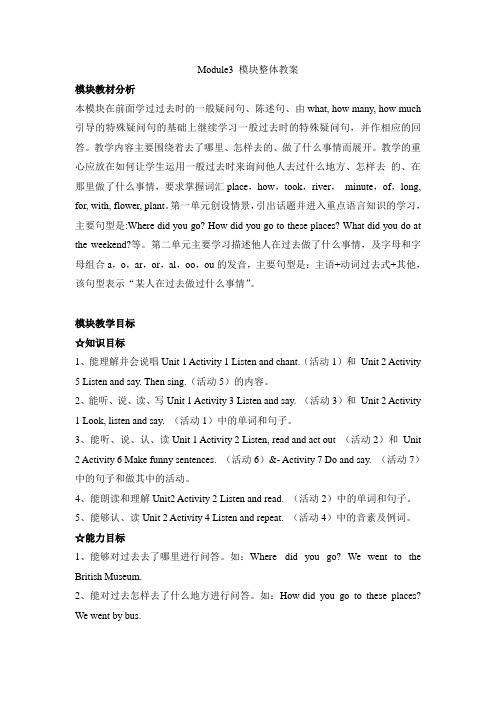
Module3 模块整体教案模块教材分析本模块在前面学过过去时的一般疑问句、陈述句、由what, how many, how much 引导的特殊疑问句的基础上继续学习一般过去时的特殊疑问句,并作相应的回答。
教学内容主要围绕着去了哪里、怎样去的、做了什么事情而展开。
教学的重心应放在如何让学生运用一般过去时来询问他人去过什么地方、怎样去的、在那里做了什么事情,要求掌握词汇place,how,took,river,minute,of,long, for, with, flower, plant。
第一单元创设情景,引出话题并进入重点语言知识的学习,主要句型是:Where did you go? How did you go to these places? What did you do at the weekend?等。
第二单元主要学习描述他人在过去做了什么事情,及字母和字母组合a,o,ar,or,al,oo,ou的发音,主要句型是:主语+动词过去式+其他,该句型表示“某人在过去做过什么事情”。
模块教学目标☆知识目标1、能理解并会说唱Unit 1 Activity 1 Listen and chant.(活动1)和Unit 2 Activity 5 Listen and say. Then sing.(活动5)的内容。
2、能听、说、读、写Unit 1 Activity 3 Listen and say. (活动3)和Unit 2 Activity 1 Look, listen and say. (活动1)中的单词和句子。
3、能听、说、认、读Unit 1 Activity 2 Listen, read and act out (活动2)和Unit 2 Activity 6 Make funny sentences. (活动6)&- Activity 7 Do and say. (活动7)中的句子和做其中的活动。
(外研版 三起)五年级英语上册Module3《At the Weekend》Unit1教案-精选文档
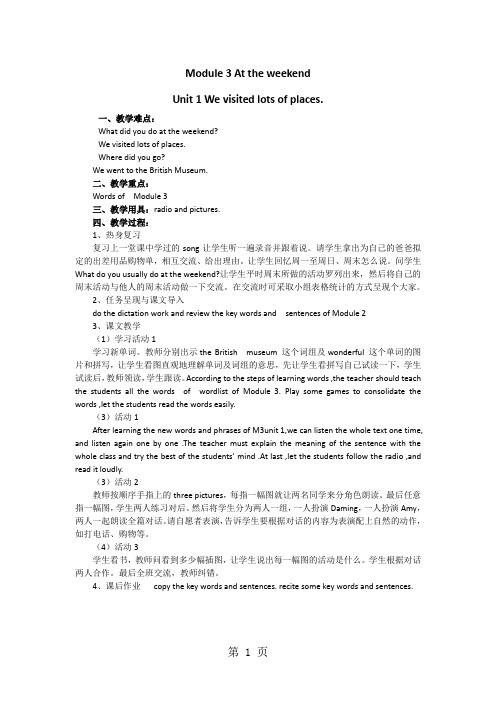
Module 3 At the weekendUnit 1 We visited lots of places.一、教学难点:What did you do at the weekend?We visited lots of places.Where did you go?We went to the British Museum.二、教学重点:Words of Module 3三、教学用具:radio and pictures.四、教学过程:1、热身复习复习上一堂课中学过的song让学生听一遍录音并跟着说。
请学生拿出为自己的爸爸拟定的出差用品购物单,相互交流、给出理由。
让学生回忆周一至周日、周末怎么说。
问学生What do you usually do at the weekend?让学生平时周末所做的活动罗列出来,然后将自己的周末活动与他人的周末活动做一下交流。
在交流时可采取小组表格统计的方式呈现个大家。
2、任务呈现与课文导入do the dictation work and review the key words and sentences of Module 23、课文教学(1)学习活动1学习新单词。
教师分别出示the British museum 这个词组及wonderful 这个单词的图片和拼写,让学生看图直观地理解单词及词组的意思,先让学生看拼写自己试读一下,学生试读后,教师领读,学生跟读。
According to the steps of learning words ,the teacher should teach the students all the words of wordlist of Module 3. Play some games to consolidate the words ,let the students read the words easily.(3)活动1After learning the new words and phrases of M3unit 1,we can listen the whole text one time, and listen again one by one .The teacher must explain the meaning of the sentence with the whole class and try the best of the students’ mind .At last ,let the students follow the radio ,and read it loudly.(3)活动2教师按顺序手指上的three pictures,每指一幅图就让两名同学来分角色朗读。
[英语]Module3 At the weekend
![[英语]Module3 At the weekend](https://img.taocdn.com/s3/m/4377ef39a300a6c30c229f40.png)
7.lots of=a lot of 8.take photos/pictures 9.take a photo 10.in the sky 11.round and round 12.go to school
7.许多 8.拍照/照相 9.拍一张照片 10.在天空中 11.一圈又一圈 12.去上学
8.我不明白/理解 9.发送某物给某人 ①发送一封明信片给 你 10.乘公共汽车 11.非常喜欢… 如:非常喜欢乘公共 汽车
根据课文回答问题
1.How many people are there in the dialogue? 2.What is Amy doing? 3.What did they do at the weekend? 4.Where did they go? 5.What’s the London Eye? 6.Did Lingling like the bus ride?
8.I don’t understand 9.send sb.sth =send sth to sb ①send you a postcard =send a postcard to you 10.the bus ride 11.like…best 如:like the bus ride best
sent
Hale Waihona Puke 3.Daming :Did Liingling like it? Amy:Yes,she did.But she liked___________ the bus ride best.
• 以暑假生活为话题,用我们学过的过去式 写一小短对话。
Unit 2What did Daming do?
It’s a big wheel. It’s wonderful.
(外研版 三起)五年级英语上册Module3《At the Weekend》Unit2教学设计
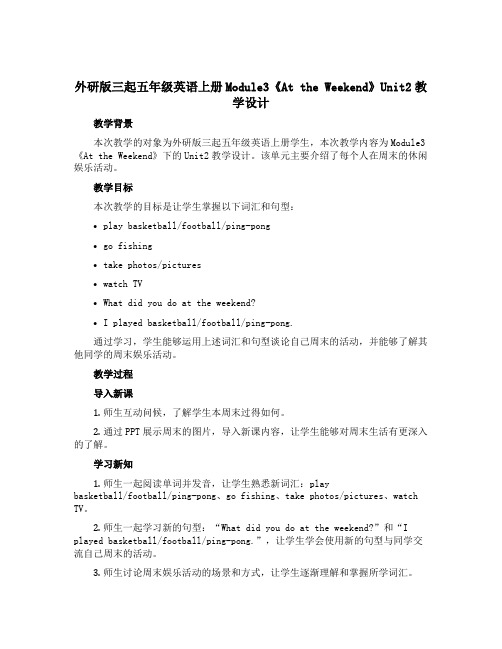
外研版三起五年级英语上册Module3《At the Weekend》Unit2教学设计教学背景本次教学的对象为外研版三起五年级英语上册学生,本次教学内容为Module3《At the Weekend》下的Unit2教学设计。
该单元主要介绍了每个人在周末的休闲娱乐活动。
教学目标本次教学的目标是让学生掌握以下词汇和句型:•play basketball/football/ping-pong•go fishing•take photos/pictures•watch TV•What did you do at the weekend?•I played basketball/football/ping-pong.通过学习,学生能够运用上述词汇和句型谈论自己周末的活动,并能够了解其他同学的周末娱乐活动。
教学过程导入新课1.师生互动问候,了解学生本周末过得如何。
2.通过PPT展示周末的图片,导入新课内容,让学生能够对周末生活有更深入的了解。
学习新知1.师生一起阅读单词并发音,让学生熟悉新词汇:playbasketball/football/ping-pong、go fishing、take photos/pictures、watch TV。
2.师生一起学习新的句型:“What did you do at the weekend?”和“I played basketball/football/ping-pong.”,让学生学会使用新的句型与同学交流自己周末的活动。
3.师生讨论周末娱乐活动的场景和方式,让学生逐渐理解和掌握所学词汇。
合作学习1.学生分小组,向组内同学介绍自己在周末的活动。
2.学生交换小组,并向新组内同学介绍自己在周末的活动。
3.学生向全班同学汇报他们了解到的其他同学的周末活动。
课堂练习1.学生个别回答“How was your weekend?”和“Did you enjoy yourself at the weekend?”等问题,巩固新句型的应用。
外研版小学英语第五册Module 3 At the weekend教学设计
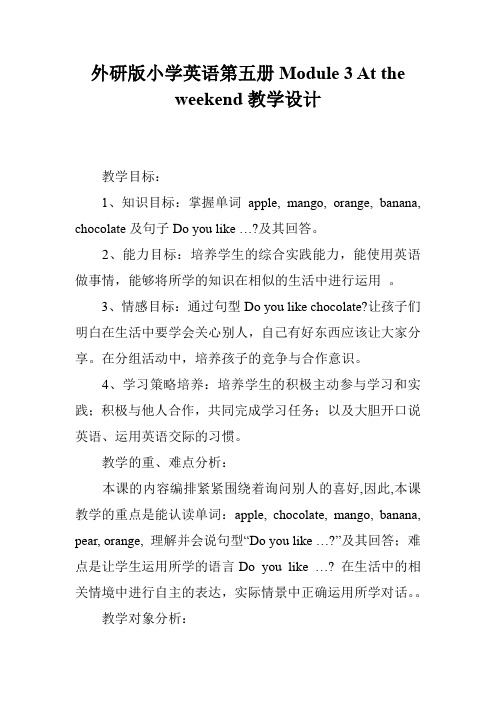
外研版小学英语第五册Module 3 At theweekend教学设计教学目标:1、知识目标:掌握单词apple, mango, orange, banana, chocolate及句子Do you like …?及其回答。
2、能力目标:培养学生的综合实践能力,能使用英语做事情,能够将所学的知识在相似的生活中进行运用。
3、情感目标:通过句型Do you like chocolate?让孩子们明白在生活中要学会关心别人,自己有好东西应该让大家分享。
在分组活动中,培养孩子的竞争与合作意识。
4、学习策略培养:培养学生的积极主动参与学习和实践;积极与他人合作,共同完成学习任务;以及大胆开口说英语、运用英语交际的习惯。
教学的重、难点分析:本课的内容编排紧紧围绕着询问别人的喜好,因此,本课教学的重点是能认读单词:apple, chocolate, mango, banana, pear, orange, 理解并会说句型“Do you like …?”及其回答;难点是让学生运用所学的语言Do you like …? 在生活中的相关情境中进行自主的表达,实际情景中正确运用所学对话。
教学对象分析:本课的教学对象是小学三年级的学生。
到目前为止他们学英语还不到一年的时间,对一些简单的英语会话及生活中的一些事物有所了解。
在第一册中学生已经学习了表达自己喜好的句子:I like…。
在本册书的第一模块中学习了句子Does he/she like …?及其回答,根据学生的认知水平和已有的知识储备,本课的新句型及单词贴近学生的生活实际,较容易理解和掌握。
教学策略及教法设计:本节课教学是依据国家基础教育小学英语课程标准的要求,根据小学生的年龄特征和任务型教学的理念进行设计的。
注重学生情感、态度、价值观的培养,同时还及时对学生的学习进行评价和激励,让学生在宽松、快乐、民主、和谐的环境中主动地学习和运用知识,掌握学习方法。
在教学设计中,关注全体学生的学习及发展,充分运用多媒体的优势,积极给孩子们创设运用英语进行交际的情景。
外研版五年级英语上册Module3《At the Weekend》Unit2教案
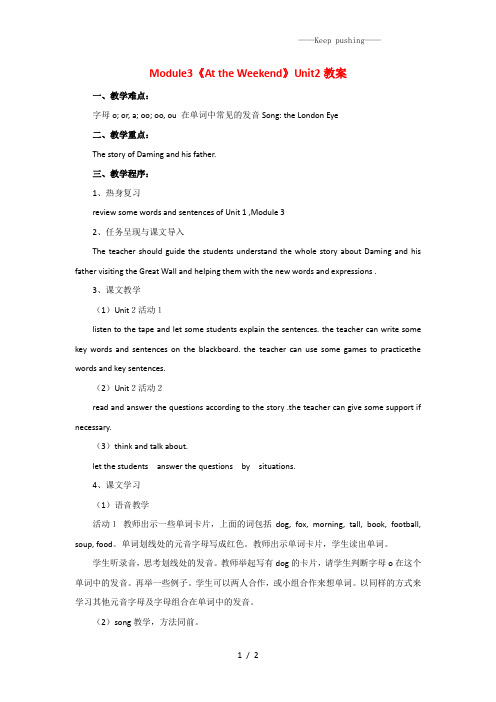
Module3《At the Weekend》Unit2教案一、教学难点:字母o; or, a; oo; oo, ou 在单词中常见的发音Song: the London Eye二、教学重点:The story of Daming and his father.三、教学程序:1、热身复习review some words and sentences of Unit 1 ,Module 32、任务呈现与课文导入The teacher should guide the students understand the whole story about Daming and his father visiting the Great Wall and helping them with the new words and expressions .3、课文教学(1)Unit2活动1listen to the tape and let some students explain the sentences. the teacher can write some key words and sentences on the blackboard. the teacher can use some games to practicethe words and key sentences.(2)Unit2活动2read and answer the questions according to the story .the teacher can give some support if necessary.(3)think and talk about.let the students answer the questions by situations.4、课文学习(1)语音教学活动1教师出示一些单词卡片,上面的词包括dog, fox, morning, tall, book, football, soup, food。
Book 5 Module 3 At the weekend教学设计
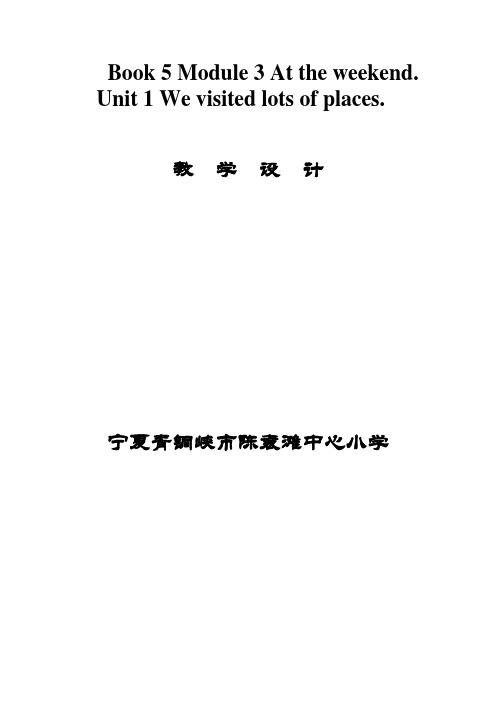
Book 5 Module 3 At the weekend. Unit 1 We visited lots of places.教学设计宁夏青铜峡市陈袁滩中心小学Book 5 Module 3 At the weekend.Unit 1 We visited lots of places.一、教材分析我执教的内容是新标准英语第五册Module 3 Unit 1。
这是一节情景对话课,围绕“What did you do at the weekend?Where did you go?”展开。
这是一节新授课,要求学生能听懂会说the British Museum, the London Eye,BigBen,wonderful,understand, postcard,利用What did you do at the weekend?进行询问及知道动词的过去式变化。
根据这一安排和学生的整体认识水平,从知识教学、能力培养等方面考虑,我确立本课时的教学目标为:1. 语言知识目标:能听、说、认读本课的重点单词:the British Museum, the London Eye, wheel, wonderful, understand, postcard; 能正确使用动词过去式;能利用What did you do? Where did you go?询问别人过去做的事情。
2.语言能力目标能根据图片听、说相应的单词,能运用What did you do? Where did you go ?询问过去的事情,并能利用动词过去式熟练表达过去所做的事情。
3.情感、策略和文化目标培养学生学习的兴趣,鼓励学生积极合作,引导学生了解西方的名胜古迹以及中西方的文化差异。
教学重点:本课中目标句型的运用和单词教学难点:单词The British Museum.的发音和目标句型教学准备:简单的PPT课件、单词卡片、录音机、学生准备旅游的照片二、学生情况分析本次优质课大赛,不让教师与学生见面,因此,在教学中我从学生的知识和生活环境出发多方面考虑:在教学设计中突出课程标准中“以人为本”的理念,设计贴近学生的学习实际和生活实际。
(外研版 三起)五年级英语上册Module3《At the Weekend》Unit1教案
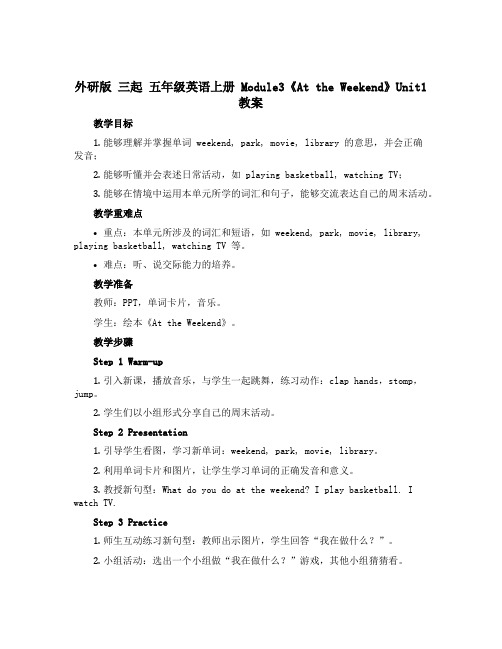
外研版三起五年级英语上册 Module3《At the Weekend》Unit1教案教学目标1.能够理解并掌握单词 weekend, park, movie, library 的意思,并会正确发音;2.能够听懂并会表述日常活动,如 playing basketball, watching TV;3.能够在情境中运用本单元所学的词汇和句子,能够交流表达自己的周末活动。
教学重难点•重点:本单元所涉及的词汇和短语,如 weekend, park, movie, library, playing basketball, watching TV 等。
•难点:听、说交际能力的培养。
教学准备教师:PPT,单词卡片,音乐。
学生:绘本《At the Weekend》。
教学步骤Step 1 Warm-up1.引入新课,播放音乐,与学生一起跳舞,练习动作:clap hands,stomp,jump。
2.学生们以小组形式分享自己的周末活动。
Step 2 Presentation1.引导学生看图,学习新单词:weekend, park, movie, library。
2.利用单词卡片和图片,让学生学习单词的正确发音和意义。
3.教授新句型:What do you do at the weekend? I play basketball. I watch TV.Step 3 Practice1.师生互动练习新句型:教师出示图片,学生回答“我在做什么?”。
2.小组活动:选出一个小组做“我在做什么?”游戏,其他小组猜猜看。
3.听力训练:教师用简单的英语告诉学生周末活动,让学生听懂,并完成听力练习手册上的练习。
Step 4 Production1.组织学生进行小组对话,让学生展示所学习的句型和单词。
2.以绘本《At the Weekend》为素材,让学生发挥想象,自己编写短小故事,并与其他同学分享。
Step 5 Summary1.让学生与教师一起总结本节课所学内容,包括单词、句型及活动。
苏教牛津版五年级英语下册《Attheweekend》Lesson3教案设计_五年级英语教案下册
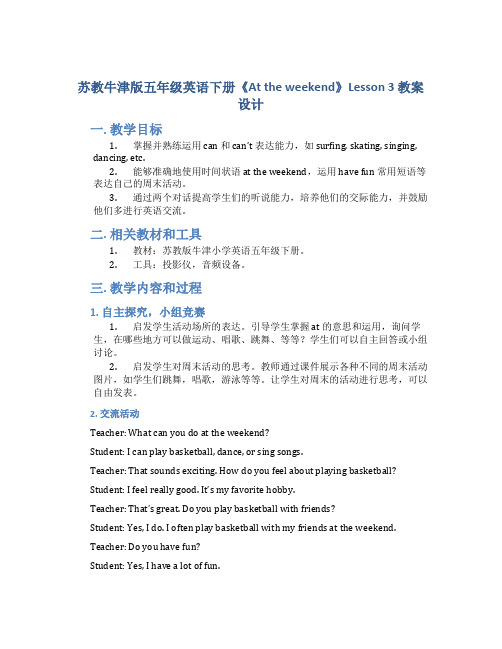
苏教牛津版五年级英语下册《At the weekend》Lesson 3 教案设计一. 教学目标1.掌握并熟练运用 can 和can’t 表达能力,如 surfing, skating, singing,dancing, etc.2.能够准确地使用时间状语 at the weekend,运用 have fun 常用短语等表达自己的周末活动。
3.通过两个对话提高学生们的听说能力,培养他们的交际能力,并鼓励他们多进行英语交流。
二. 相关教材和工具1.教材:苏教版牛津小学英语五年级下册。
2.工具:投影仪,音频设备。
三. 教学内容和过程1. 自主探究,小组竞赛1.启发学生活动场所的表达。
引导学生掌握 at 的意思和运用,询问学生,在哪些地方可以做运动、唱歌、跳舞、等等?学生们可以自主回答或小组讨论。
2.启发学生对周末活动的思考。
教师通过课件展示各种不同的周末活动图片,如学生们跳舞,唱歌,游泳等等。
让学生对周末的活动进行思考,可以自由发表。
2. 交流活动Teacher: What can you do at the weekend?Student: I can play basketball, dance, or sing songs.Teacher: That sounds exciting. How do you feel about playing basketball?Student: I feel really good. It’s my favorite hobby.Teacher: That’s great. Do you play basketball with friends?Student: Yes, I do. I often play basketball with my friends at the weekend.Teacher: Do you have fun?Student: Yes, I have a lot of fun.3.启发学生复合句的运用。
苏教牛津版五年级英语下册《Attheweekend》Lesson3教案设计_五年级英语教案下册
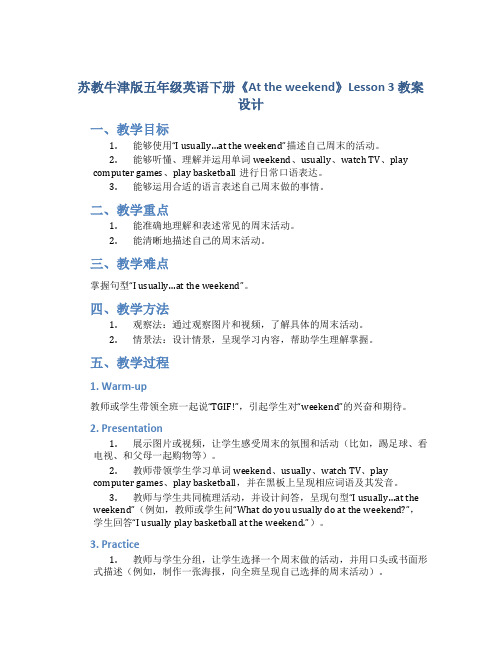
苏教牛津版五年级英语下册《At the weekend》Lesson 3 教案设计一、教学目标1.能够使用“I usually…at the weekend”描述自己周末的活动。
2.能够听懂、理解并运用单词weekend、usually、watch TV、playcomputer games、play basketball进行日常口语表达。
3.能够运用合适的语言表述自己周末做的事情。
二、教学重点1.能准确地理解和表述常见的周末活动。
2.能清晰地描述自己的周末活动。
三、教学难点掌握句型“I usually…at the weekend”。
四、教学方法1.观察法:通过观察图片和视频,了解具体的周末活动。
2.情景法:设计情景,呈现学习内容,帮助学生理解掌握。
五、教学过程1. Warm-up教师或学生带领全班一起说“TGIF!”,引起学生对“weekend”的兴奋和期待。
2. Presentation1.展示图片或视频,让学生感受周末的氛围和活动(比如,踢足球、看电视、和父母一起购物等)。
2.教师带领学生学习单词weekend、usually、watch TV、playcomputer games、play basketball,并在黑板上呈现相应词语及其发音。
3.教师与学生共同梳理活动,并设计问答,呈现句型“I usually…at theweekend”(例如,教师或学生问“What do you usually do at the weekend?”,学生回答“I usually play basketball at the weekend.”)。
3. Practice1.教师与学生分组,让学生选择一个周末做的活动,并用口头或书面形式描述(例如,制作一张海报,向全班呈现自己选择的周末活动)。
2.教师带领学生进行角色扮演,模拟真实场景,让学生能在实际交际中运用所学语言(例如,两个学生互相问答对方的周末活动)。
(外研版 三起)五年级英语上册Module3《At the Weekend》Unit1教学设计
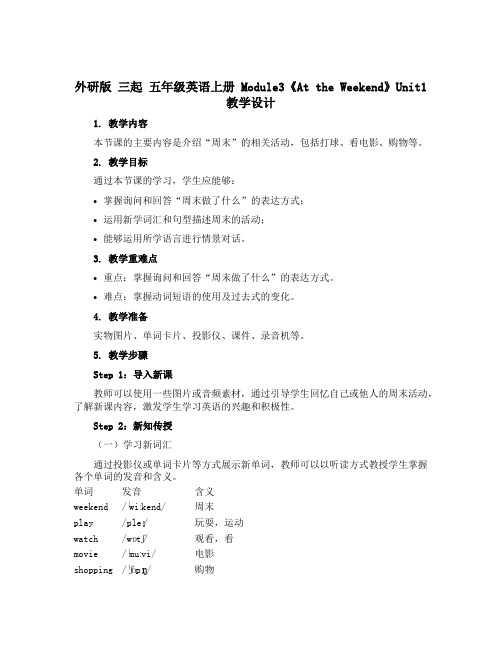
外研版三起五年级英语上册 Module3《At the Weekend》Unit1教学设计1. 教学内容本节课的主要内容是介绍“周末”的相关活动,包括打球、看电影、购物等。
2. 教学目标通过本节课的学习,学生应能够:•掌握询问和回答“周末做了什么”的表达方式;•运用新学词汇和句型描述周末的活动;•能够运用所学语言进行情景对话。
3. 教学重难点•重点:掌握询问和回答“周末做了什么”的表达方式。
•难点:掌握动词短语的使用及过去式的变化。
4. 教学准备实物图片、单词卡片、投影仪、课件、录音机等。
5. 教学步骤Step 1:导入新课教师可以使用一些图片或音频素材,通过引导学生回忆自己或他人的周末活动,了解新课内容,激发学生学习英语的兴趣和积极性。
Step 2:新知传授(一)学习新词汇通过投影仪或单词卡片等方式展示新单词,教师可以以听读方式教授学生掌握各个单词的发音和含义。
单词发音含义weekend/ˈwiːkend/周末play/pleɪ/玩耍,运动watch/wɒtʃ/观看,看movie/ˈmuːvi/电影shopping/ˈʃɒpɪŋ/购物(二)学习新句型教师可以将新句型呈现在课件或黑板上,注重表达方式的模仿和运用,让学生理解其含义的同时也能掌握用法。
Wh- 询问句:What did you do at the weekend?选择肯定答案的回答:I played basketball.The Past Tense:play - played,watch - watchedStep 3:练习环节(一)练习语音通过录音机的方式模拟英语语音,让学生模仿并纠正发音错误。
(二)练习新单词让学生根据听力或图片等方式认读新单词,进一步巩固记忆,并适当增加语感练习。
(三)练习新句型教师可以设计一些情景对话,让学生在模拟的情景下进行练习,巩固所学语言。
A: What did you do at the weekend?B: I watched a movie.A: What movie did you watch?B: I watched Spiderman.(四)练习综合运用教师可以设计一些综合练习,让学生在语言运用中深化对所学知识的理解和记忆。
新外研版五年级英语上册Module3《At the Weekend》Unit2教案.doc
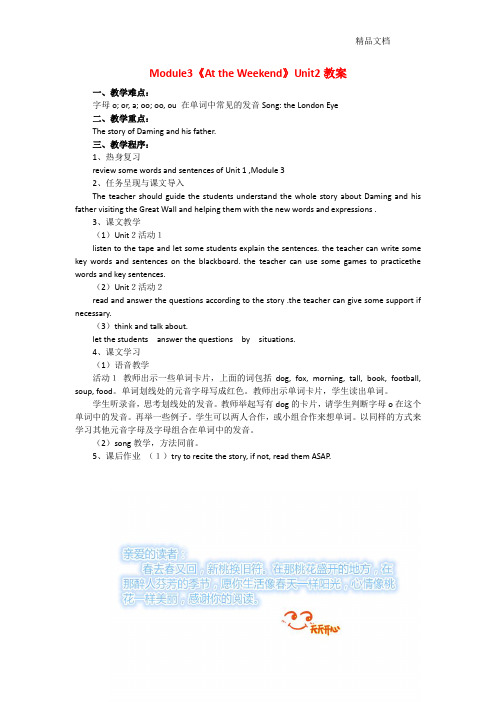
精品文档Module3《At the Weekend》Unit2教案一、教学难点:字母o; or, a; oo; oo, ou 在单词中常见的发音Song: the London Eye二、教学重点:The story of Daming and his father.三、教学程序:1、热身复习review some words and sentences of Unit 1 ,Module 32、任务呈现与课文导入The teacher should guide the students understand the whole story about Daming and his father visiting the Great Wall and helping them with the new words and expressions .3、课文教学(1)Unit2活动1listen to the tape and let some students explain the sentences. the teacher can write some key words and sentences on the blackboard. the teacher can use some games to practicethe words and key sentences.(2)Unit2活动2read and answer the questions according to the story .the teacher can give some support if necessary.(3)think and talk about.let the students answer the questions by situations.4、课文学习(1)语音教学活动1教师出示一些单词卡片,上面的词包括dog, fox, morning, tall, book, football, soup, food。
Module3Unit1Whatareyougoingtodoattheweekend教案
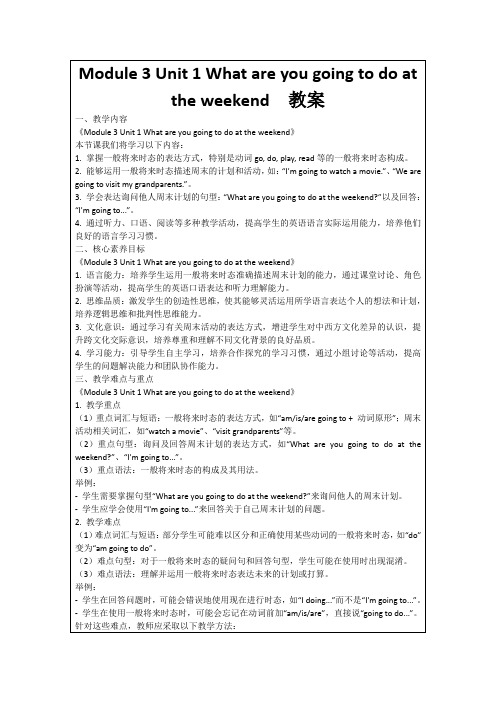
1.理论介绍:首先,我们要了解一般将来时态的基本概念。一般将来时态是用来描述未来将要发生的事情或计划。它是英语中非常重要的时态之一,因为它帮助我们谈论未来的计划和预期。
2.案例分析:接下来,我们来看一个具体的案例。这个案例展示了如何用一般将来时态描述周末计划,以及它如何帮助我们与他人交流。
-学生应学会使用“I'm going to...”来回答关于自己周末计划的问题。
2.教学难点
(1)难点词汇与短语:部分学生可能难以区分和正确使用某些动词的一般将来时态,如“do”变为“am going to do”。
(2)难点句型:对于一般将来时态的疑问句和回答句型,学生可能在使用时出现混淆。
(3)难点语法:理解并运用一般将来时态表达未来的计划或打算。
4.通过听力、口语、阅读等多种教学活动,提高学生的英语语言实际运用能力,培养他们良好的语言学习习惯。
二、核心素养目标
《Module 3 Unit 1 What are you going to do at the weekend》
1.语言能力:培养学生运用一般将来时态准确描述周末计划的能力,通过课堂讨论、角色扮演等活动,提高学生的英语口语表达和听力理解能力。
此外,我还注意到在课堂总结时,部分学生对于一般将来时态的应用仍然存在疑问。为了帮助他们更好地消化和理解这些知识点,我决定在课后提供一些额外的学习资源,如在线练习和视频讲解,以供他们自主学习。
举例:
-学生在回答问题时,可能会错误地使用现在进行时态,如“I doing...”而不是“I'm going to...”。
-学生在使用一般将来时态时,可能会忘记在动词前加“am/is/are”,直接说“going to do...”。
外研版英语五上《Module 3 At the Weekend》(unit1)word教案(一)
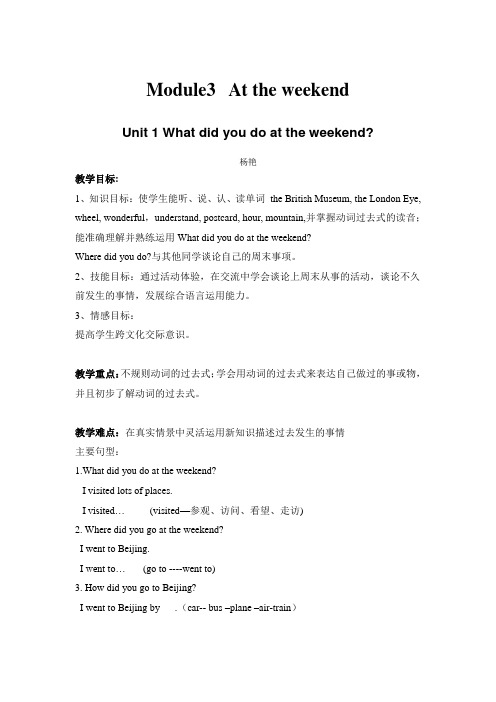
Module3 At the weekendUnit 1 What did you do at the weekend?杨艳教学目标:1、知识目标:使学生能听、说、认、读单词the British Museum, the London Eye, wheel, wonderful,understand, postcard, hour, mountain,并掌握动词过去式的读音;能准确理解并熟练运用What did you do at the weekend?Where did you do?与其他同学谈论自己的周末事项。
2、技能目标:通过活动体验,在交流中学会谈论上周末从事的活动,谈论不久前发生的事情,发展综合语言运用能力。
3、情感目标:提高学生跨文化交际意识。
教学重点:不规则动词的过去式;学会用动词的过去式来表达自己做过的事或物,并且初步了解动词的过去式。
教学难点:在真实情景中灵活运用新知识描述过去发生的事情主要句型:1.What did you do at the weekend?I visited lots of places.I visited…(visited—参观、访问、看望、走访)2. Where did you go at the weekend?I went to Beijing.I went to…(go to ----went to)3. How did you go to Beijing?I went to Beijing by .(car-- bus –plane –air-train)Teaching procedures:Step1. Warm-up1、Greeting2. Sing a song: Where did you go?3、Game把学生分为4组,两组之间进行比赛。
A组的同学按座位顺序依次说动词原形,B组座位相应座位的同学说出动词的过去时。
(回答得又准又快的组获得一颗五角星。
Unit 5 At the weekend 第三课时 (教案)
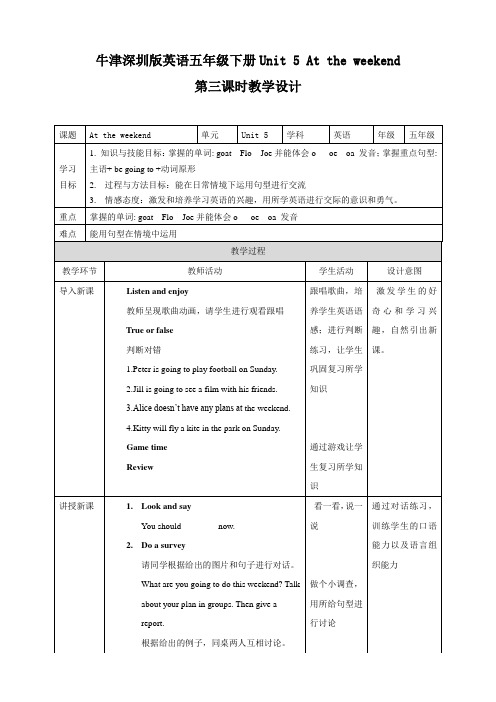
根据给出的例子,同桌两人互相讨论。
3.Think and write
根据给出的例子,同桌两人互相讨论写一写你的周末
My weekend
B.going to
C.goes
8.Summary
根据板书复述今天学习的内容:
单词: goat Flo Joe
句子:主语+ be going to +动词原形
10. Homework.
1. Listen and read thedialoguefive times.
2. Copy the new new words and phrases .
牛津深圳版英语五年级下册Unit 5 At the weekend
第三课时教学设计
课题
At the weekend
单元
Unit5
学科
英语
年级
五年级
学习
目标
1.知识与技能目标:掌握的单词:goat Flo Joe并能体会o oe oa发音;掌握重点句型:主语+ be going to +动词原形
2.过程与方法目标:能在日常情境下运用句型进行交流
看一看,说一说
做个小调查,用所给句型进行讨论
讨论自己的周末
让学生进行对话
通过动画以及录音进行语音学习
用作给的句子进行表达
练习
通过对话练习,训练学生的口语能力以及语言组织能力
学习形式生动多样化,使学生集中注意力,同时保持学习的积极性。
帮助学生建立归纳语音知是能理解并会朗读故事;能听懂、会说、会拼读单词Flo Joe goat本课为新授课,通过反复播放录音视频并跟读模仿学习语音知识;通过灵活多样,丰富多彩的课堂形式的进行,熟悉课文内容,进而可以感受语音带来的魅力,激发学生学习英语的兴趣,增强他们的自信心,通过教学评价的开展,让学生体验到成就感,促进学生学习和发展。
Unit5 At the weekend 第3课时教学设计
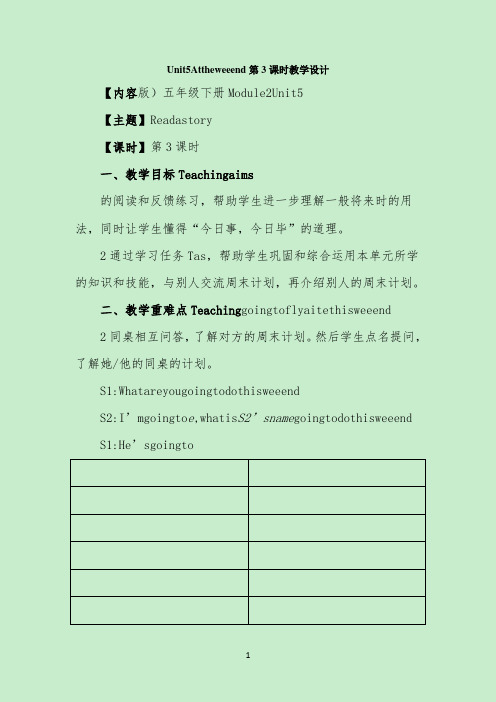
Unit5Attheweeend第3课时教学设计【内容版)五年级下册Module2Unit5【主题】Readastory【课时】第3课时一、教学目标Teachingaims的阅读和反馈练习,帮助学生进一步理解一般将来时的用法,同时让学生懂得“今日事,今日毕”的道理。
2通过学习任务Tas,帮助学生巩固和综合运用本单元所学的知识和技能,与别人交流周末计划,再介绍别人的周末计划。
二、教学重难点Teaching goingtoflyaitethisweeend2同桌相互问答,了解对方的周末计划。
然后学生点名提问,了解她/他的同桌的计划。
S1:WhatareyougoingtodothisweeendS2:I’mgoingto e,whatis S2’sname goingtodothisweeendS1:He’sgoingtoorrow,net,cry,until,学生学习单词。
教师可以通过提问等方式帮助学生掌握这些单词。
T:CanyoubuildahouseS1:No,Ican’tT:WhatareyougoingtoeattomorrowmorningS1:I’mgoingtoeatsomebread2请学生根据课文完成课本第33页的剧本,然后全班集体交流核对答案。
3再次播放录音,学生逐句跟读。
鼓励学生把猴子变化的心情读出来。
’twaituntiltomorrow的意思,思考故事的寓意,让学生认识到将计划付诸行动的重要性。
还可以让学生续写故事的结局,写一写小猴子造房子的经过和住进新房子的感想,鼓励学生表演故事。
Post-tasactivities1根据已经完成的剧本,学生两人一组表演故事《明日复明日》。
教师在教室内来回巡视,必要时给予帮助指导。
2根据《练习册》中的Tas,要求学生两人一组互相问答,了解同学的周末计划。
然后,学生根据问答所得信息完成关于周末计划的表格。
最后,作为回家作业,请学生完成Thinandwrite,写一写同桌的周末计划。
- 1、下载文档前请自行甄别文档内容的完整性,平台不提供额外的编辑、内容补充、找答案等附加服务。
- 2、"仅部分预览"的文档,不可在线预览部分如存在完整性等问题,可反馈申请退款(可完整预览的文档不适用该条件!)。
- 3、如文档侵犯您的权益,请联系客服反馈,我们会尽快为您处理(人工客服工作时间:9:00-18:30)。
小学英语教学设计Book 5 Module 3 At the weekend.Unit 1 We visited lots of places.1. 语言知识目标:能听、说、认读本课的重点单词:the British Museum, the LondonEye, wheel, wonderful, understand, postcard; 能正确使用动词过去式;能利用What did you do? Where did you go? 询问别人过去做过的事情。
2.语言能力目标能根据图片听、说相应的单词,能运用What did you do? Where did you go ? 询问过去的事情,并能利用动词过去式熟练表达过去所做的事情。
3.情感、策略和文化目标培养学生学习的兴趣,鼓励学生积极合作,引导学生了解西方的名胜古迹以及中西方的文化差异。
5.教学重点:本课中目标句型的运用和单词6.教学难点:单词The British Museum.的发音和目标句型7.教学准备:简单的PPT课件、单词卡片、录音机、学生准备旅游的照片二、学生情况分析本次优质课大赛,不让教师与学生见面,因此,在教学中我从学生的知识和生活环境出发多方面考虑,在教学设计中突出课程标准中“以人为本”的理念,设计贴近学生的学习实际和生活实际。
面对五年级的学生,虽然有一定的英语基础,可是在自由表达方面存在困难,教学设计中我突出了教学的多样性和层次性。
又因为是借班上课,我对学生不熟悉和学生对我的课堂口语的陌生,也许课堂会产生很多的不和谐。
为此我有效将评价及时运用到课堂中,增加学生学习的积极性。
三、教学过程一、Warming-up1 greeting:T: Hello, everyone! My English name is Amy, nice to meet you .Ss: Nice to meet you, too.T: Do you like English songs ? Let’s sing a song “where did you go ?(设计意图:与学生口语的对话,拉近教师与学生的距离。
利用歌曲中的问句where did you go ? What did you do? 激活学生的思维,为新课的语言知识结构做好铺垫。
)二、presentation1 lead inT: where did I go at the weekend ? let’s play a game ?Guess ,look at the screen (看图读句子)Write down a title: Module 3 At the weekend(设计意图:结合猜的游戏,引出要学习的句型和本模块的主题,并解释周末在中国和西方不同的文化差异。
)T: I had a dream yesterday: I visited lots of places with my friend .We visited lotsof places(设计意图:为了将课文很好的串起来,我把自己变为对话中的人物Amy。
巧妙把课文内容用做梦的形式体现。
)2 Teaching new words(1) The British Museum (呈现单词卡片)反复纠正发音(板书句子,where did you go ?)反复回答: We went to The British Museum. We went to …(设计意图:为了体现英语课程标准中,“听说先行,读写跟上的原则”。
我在单词的教学中时刻注意词不离句,句不离目标句型,紧密与教学内容结合。
)(2) The London Eye (呈现单词卡片)T:who can read it ?Ss: the London Eye .T:We visited the London Eye .(课件呈现句子,The London Eye is a big wheel ,单词卡片:wheel(3) wonderful (呈现单词卡片) :T: I think the London Eye is wonderful .do you know about the great wall ? Howabout the great wall ? ( the great wall is wonderful )How about the yellow river ?( the yellow river is wonderful , too )(设计意图:英语教学同时也是语言教学,因此,语言是一种活的知识,它需要不断的去在现实中应用。
我把wonderful这个词用在不同的场景中,让学生感知wonderful的意义。
)(4)呈现三组图片,I liked the British Museum best, How about you ?(设计意图:本课教学中出现I liked…best句型,针对这个句型在训练中有难度,我直接采取三幅与教学内容有关的图片,自己做出选择,然后说出语言句型,引导学生运用I liked…best说出自己的喜好。
)(5)直观呈现单词:postcard, understand3 Teaching text :(1) This morning ,I phoned Damming told my dream ,please listen(2)the first ,look at the screen (呈现问题,依次用汉语解释。
(3)The second :listen to the tape and think over) .(设计意图:设计中紧紧利用dream这条线,将所有内容串起来,给学生以完整的故事。
所以把教学的对话以打电话的形式给予学生,并结合教学的目标句型。
首先给予问题,并解释问题,其次,播放教学对话,让学生带着问题去听。
做到英语教学中教师的指令一定要明确,让学生有目的的去听。
)(4) Answer the question(5) Now listen and repeat(6) The teacher teach the dialogue(7) Read by yourself(8) check up reading: I speak Chinese ,you speak English(设计意图:英语教学的语篇教学中,首先让学生感知文本,然后要体验文本,最后,要将文本的训练项目得以体现。
教学中我打开课本带着问题题入手,让学生初步感知文本;接着结合问题说出自己对内容的了解。
紧跟着教师让学生通过两边的读来感悟文本。
当有一定基础后,学生自己读。
三遍的读后,为了监测读的效果,我采用I speak Chinese ,your speak English的方法。
这样做是一举多得:其一,把本文的重点句子,提出引起学生的注意;其二,将课文内容给学生翻译,进一步帮助学生理解;其三,听一听学生读的情况,教师掌握学生的学情,随时调整教学步骤。
)三、practice(1) Talk about your trip呈现图片:In this summer holiday , I went to Beijing ,I visited the great wall ,Itis very old ,It’s very famous I visited the summer places .(2)talk about your trip (采用百零八塔,鸟岛,青秀园,黄河公园,拦河大坝)(3)教师巡视辅导。
(4)学生交流。
(设计意图:小学英语课程目标指出:小学英语的教学任务是培养学生学习英语的兴趣。
因此,我联系学生的生活实际来训练目标句型。
图片呈现我们周围学生知道并亲身游览过的图片,极大的激发学生的学习兴趣。
老师可以根据自己的亲身经历给学生做示范,单词教学中大量的句型练习为这一阶段已经做好铺垫。
老师适时的评价,相信这一步骤会是本课的亮点。
)四、Extent :(1)T: ok ,your trip are interesting ,Amy wrote a journey about her dream ,but she did n’t finished ,who can help her ?(呈现journey )(2) Ss: fill in the blanks(3) 请学生交流(4) 朗读journey(设计意图:小学英语课程目标指出:小学英语的教学任务是培养学生学习英语的兴趣。
通过听、说、读、写四条途径来提高学生的英语能力。
五年级学生已经有一定的英语基础,同时也为了体现教学的层次性,我利用补充填空的形式,将对话的梗概以日记的形式体现。
既巩固本课的教学重、难点,又落实了英语教学中写的训练项目。
)五、summary评价(结合内容和学生课堂的表现给予合适的评价)六、homework1. 假设你是玲玲,给大明写一张明信片,告诉他你在伦敦的周末是怎么度过的给2. 与朋友进行分角色对话朗读对话,并抄写单词。
板书设计:.. Module 3 At the weekendUnit 1 We visited lots of places.…………………A: What did you do at the weekend ?B: We visited lots of places.A: Where did you go ?B: We went to …….. (The British Museum, The London Eye …)。
